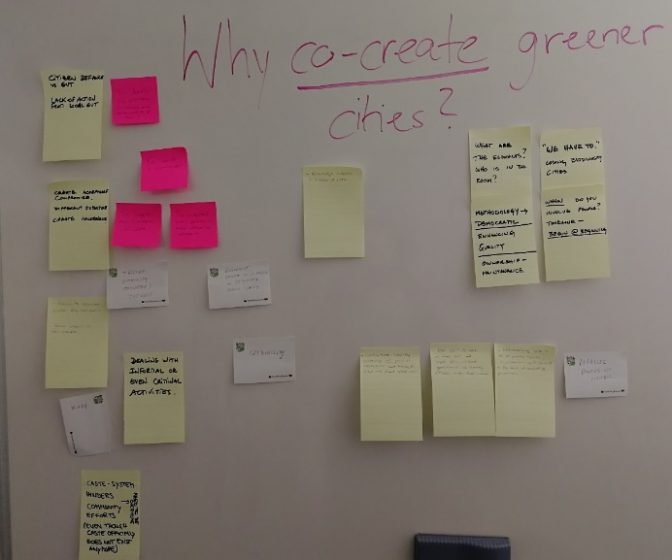 Co-creation engenders a focus on process of greening cities rather than on results only. Alexander van der Jagt (Utrecht University) introduced co-creation as collaborative knowledge sharing between local policymakers, researchers, citizens, practitioners, entrepreneurs, and practically any kind of actor bringing in specific knowledge about local needs and solutions, building on insights from the NATURVATION and GREEN SURGE projects. Session participants echoed the need to step away from pre-defined issues and solutions towards reframing problems that open up the view on what interventions are needed and possible. Co-creation allows engagement with unusualsuspects, such as the horticulture industry, and to thus enhance quality of solutions. Governments are not able to green cities on their own and seek to tap into the strengths of communities: co-creation empowers and strengthens capacities of local communities by sharing responsibilities and cultures. Experiences from developing country contexts enrich the European perspectives in Connecting Nature on co-creation: the absence of an identity of citizenry was highlighted as key challenge for creating greener and better cities in for example Brazilian and Somalian contexts. Here, co-creation is a way to support identity-building, as well as to collect knowledge in the absence of data and to deal with informal activities.
Co-creation engenders a focus on process of greening cities rather than on results only. Alexander van der Jagt (Utrecht University) introduced co-creation as collaborative knowledge sharing between local policymakers, researchers, citizens, practitioners, entrepreneurs, and practically any kind of actor bringing in specific knowledge about local needs and solutions, building on insights from the NATURVATION and GREEN SURGE projects. Session participants echoed the need to step away from pre-defined issues and solutions towards reframing problems that open up the view on what interventions are needed and possible. Co-creation allows engagement with unusualsuspects, such as the horticulture industry, and to thus enhance quality of solutions. Governments are not able to green cities on their own and seek to tap into the strengths of communities: co-creation empowers and strengthens capacities of local communities by sharing responsibilities and cultures. Experiences from developing country contexts enrich the European perspectives in Connecting Nature on co-creation: the absence of an identity of citizenry was highlighted as key challenge for creating greener and better cities in for example Brazilian and Somalian contexts. Here, co-creation is a way to support identity-building, as well as to collect knowledge in the absence of data and to deal with informal activities.
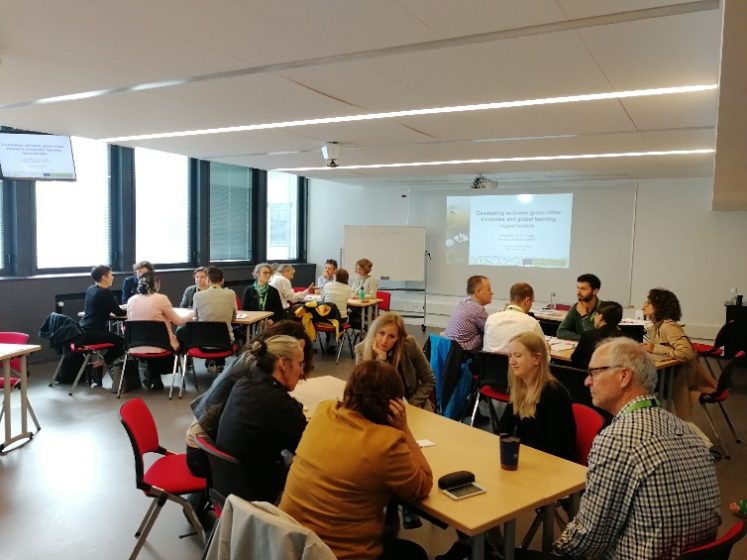 While there is much talk about co-creation and the many opportunities it offers, knowledge about how to set-up and facilitate co-creation processes is limited. Katharina Hölscher presented a practice-oriented design framework for co-creating nature-based interventions. Drawing on the work of Niki Frantzeskaki (Swineburne University of Technology), the framework highlights quality principles and provides guidance for inclusive, legitimate, and open co-creation processes that result in policy and planning relevant knowledge, new solutions and empowerment.
While there is much talk about co-creation and the many opportunities it offers, knowledge about how to set-up and facilitate co-creation processes is limited. Katharina Hölscher presented a practice-oriented design framework for co-creating nature-based interventions. Drawing on the work of Niki Frantzeskaki (Swineburne University of Technology), the framework highlights quality principles and provides guidance for inclusive, legitimate, and open co-creation processes that result in policy and planning relevant knowledge, new solutions and empowerment.
- Inclusivity for bringing together diverse actors and multiple types of knowledge at equal level.
- Openness to adopt, integrate and share knowledge throughout.
- Legitimacy to ensure that the process includes legitimate and credible knowledge and is trusted by participants and wider urban actors.
- Actionable knowledge ensures that the co-produced knowledge outputs are immediate relevant and translated into policy and planning.
- Usable knowledge and empowerment ensure that the co-produced knowledge outputs are valuable to and taken up by multiple urban actors.
- Extending institutions ensures that the co-produced knowledge outputs connect to multiple goals, strategies and agendas within the city to create synergies across sectors.
Highlighting opportunities for linking citizen initiatives and formal policy frameworks, Gilles Lecuir (Ile-de-France Regional Authority for Biodiversity, France) reflected on the long-term collaboration between citizens and the local governments to greening, and maintaining greened, sidewalks in French cities. While the initiative has grown out of a citizen initiative, the local governments took over to coordinate and facilitate the greening, for example by allocating and depaving lots for greening.
An example from outside Europe was presented by Ana Pellegrino (City of Niteroi, Brazil): a lasting challenge is to get citizens to participate, also due to fear from speaking out against powerful actors. Actively going out to communities and holding regular meetings that are open to the entire community are important conditions for enabling co-creation. Getting inhabitants from different communities to participate helped to enhance shared understanding between such, showing that there is common agreement about needs and desires.
The examples from the three cities demonstrated the multiple faces and facets of co-creation, but the sharing of experiences also revealed opportunities for learning from each other. Given the novelty and experimental nature of co-creation, there is a need for global learning about when and how to do co-creation. Alice Reil presented the Connecting Nature UrbanByNature Programme, which offers such learning opportunities for urban nature pioneers. The challenge is to identify transferable lessons—for example about when to involve what type of people and how to create space for co-creation. Co-creation goes against the usual policy and planning logics in cities worldwide: to ensure financing, projects usually have to first be developed.
Next to transferable lessons, it became clear during the session that context and local culture matters. In developing country cities, co-creating greener and better cities needs to first overcome lack of local identities and lack of trust in fair and safe participation opportunities.
Katharina Holscher and Alice Reil
Rotterdam and Freiburg
This essay also appears at on the Connecting Nature website.
This TNOC Summit Seed Session included the following participants: Alice Reil, Arun Mishra, Adèle Gaveau, Ryan Bellinson, Aimee Gauthier, Simon Pittman, Kristin Ohlson, Thibaud Griessinger, François Mancebo, Yeowon Kim, Katharina Holscher, Katherine Moseley, Katalin Czippan, Mariana Nicolletti, Ines Vaittinen, Giles Lecuir, Gillian Dick, Catherine Harris, Alexander van der Jagt, Ferne Edwards, Kim Ressar, Valerie Gwinner, Camille Tallon, Anouck Barcat, Cecilia Herzog, Judy Bush, Oliver Hillel, Aidan ffrench
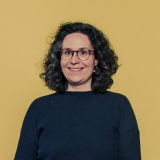
about the writer
Alice Reil
Alice Reil (she/her) is an urban geographer who strives to bring more biodiverse, urban nature into public spaces. She led the biodiversity and nature-based solutions team at ICLEI Europe, a global city network, and now works at the City of Munich’s green space planning department.

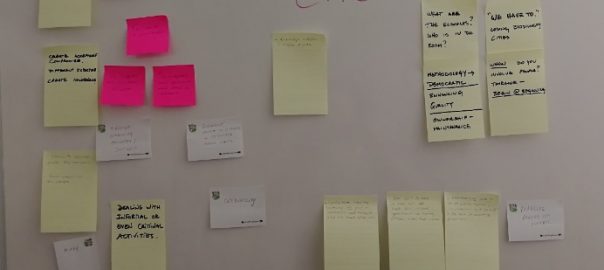

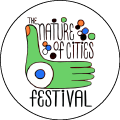
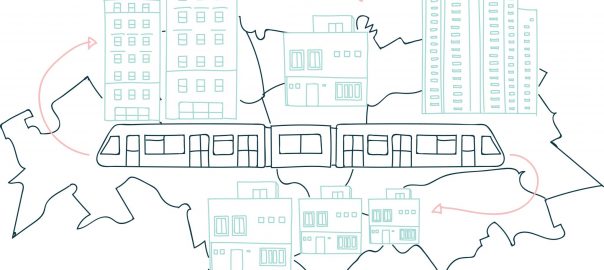
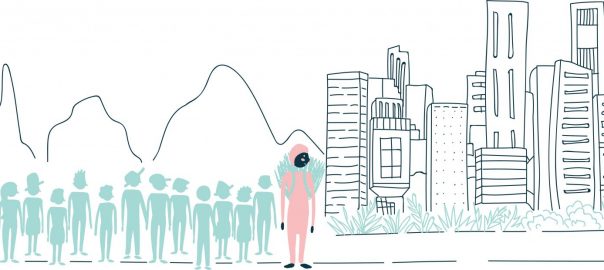
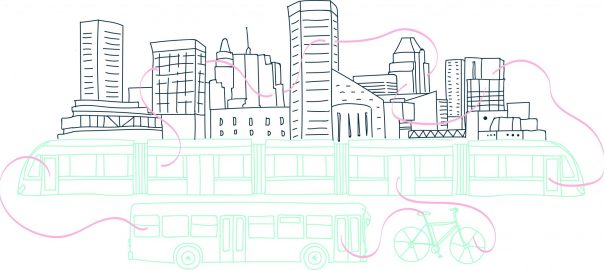
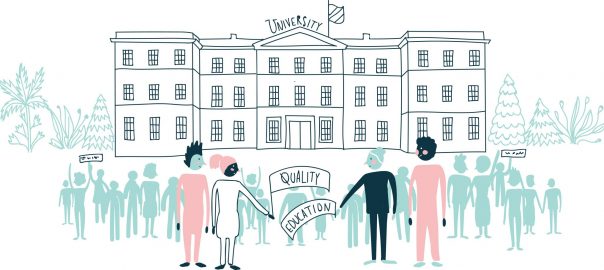
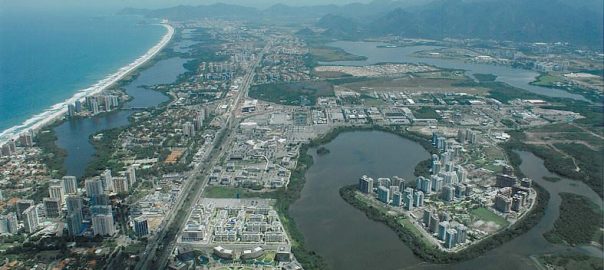
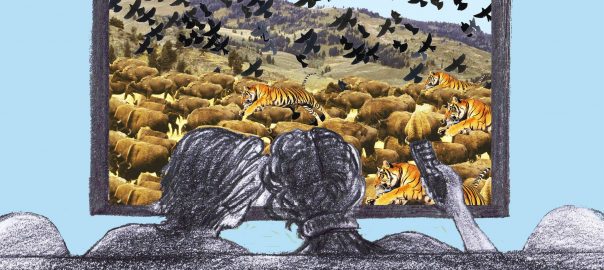
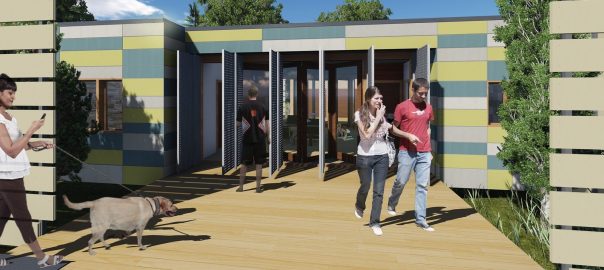
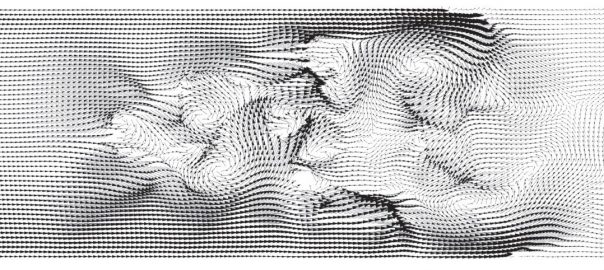
Add a Comment
Join our conversation